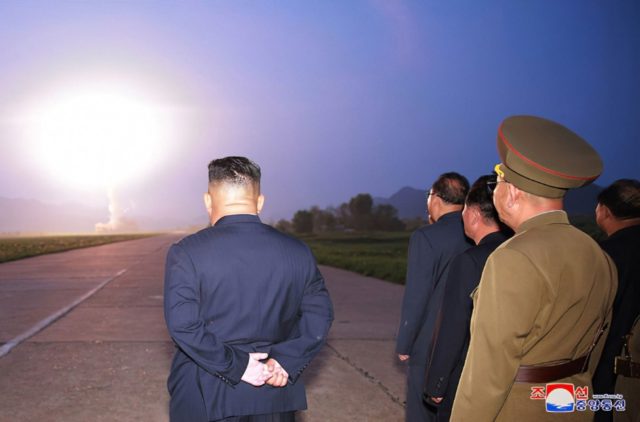SEOUL, Sept. 2 (UPI) — A group of U.S. government agencies issued a joint advisory saying that North Korea continues to seek key items for its missile programs and warned that several industries run the risk of violating international sanctions against the communist state.
The advisory, released Tuesday by the State, Commerce and Treasury Departments, said the United States is “committing to disrupting” North Korea’s attempts to procure foreign-sourced materials for its ballistic missile program.
“It is critical that private sector companies and individuals be aware of key items sought by the North Korean weapons programs, North Korean procurement tactics and techniques, the risks of involvement in North Korea’s ballistic missile-related procurements and the potential consequences they face,” the advisory said.
The electronics, chemicals and metals industries are particularly at risk of violating sanctions, even inadvertently, the advisory cautioned. Financial, transportation and logistics sectors are also potentially exposed.
Specific items that North Korea imports for its missile program range from heavy-duty trucks used for launchers to metals such as steel and aluminum to gyroscopes.
North Korea utilizes an “extensive overseas network of procurement agents,” such as officials who operate from North Korean diplomatic missions and trade offices, the advisory said, and also collaborates with Chinese and Russian companies.
No new sanctions were introduced along with the advisory.
On Monday, the Justice Department announced that a British Virgin Islands-registered company pleaded guilty to money laundering in order to evade North Korea sanctions, while last week a North Korean firm contracted to exchange alcohol for South Korean sugar was found to be under U.S. and international sanctions.
A report released by a Washington, D.C., think tank in July found that 62 countries had violated sanctions against North Korea in 2019.
The U.N. Security Council toughened sanctions in 2017 after Pyongyang tested long-range ballistic missiles and detonated a nuclear weapon at its Punggye-ri test site.
The sanctions have remained a sticking point in nuclear negotiations between North Korea and the United States, which have been stalled since a summit between U.S. President Donald Trump and North Korean leader Kim Jong Un in February 2018 failed to produce an agreement.
After a 17-month hiatus, Pyongyang began testing weapons again in the latter half of 2019 and has continued to conduct missile launches throughout 2020.
With just two months before the presidential election, Trump has been touting his accomplishments in dealing with North Korea.
“We actually have a relationship with North Korea, which is something that was never established by the previous administration,” Trump boasted in July, adding that he would make deals with North Korea “very quickly” if re-elected.
On Tuesday, the State Department also announced that it was extending a travel ban for American citizens to North Korea for a third time. The ban was initiated in September 2017 following the death of Otto Warmbier, a college student who was arrested in North Korea for allegedly stealing a propaganda poster in 2016.
He was released by North Korea in June 2017 in a vegetative state and died six days after returning home.
“The Department of State has determined that there continues to be serious risk to United States citizens and nationals of arrest and long-term detention representing imminent danger to their physical safety,” the notice said.

COMMENTS
Please let us know if you're having issues with commenting.